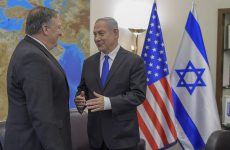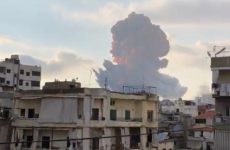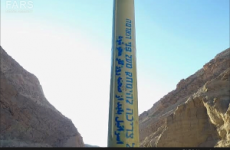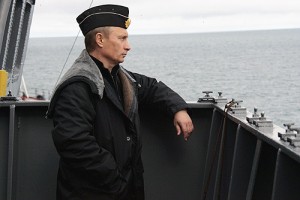
‘I came, I bombed, now I’m kingmaker of Syria!‘ Russian President Vladimir Putin is now calling the shots in what is left of the former Syrian state left in ruins after five years of a horrific bloodbath. All the sides, except for the Russians, are now trying to catch their breath in the current cease-fire, while the negotiators have gathered in Geneva seeking some way forward. It was the massive Russian air strikes, which started suddenly five months ago and ended just as surprisingly this week, that have halted the internecine warfare.
Putin ‘sent in the cavalry’, Russian fighter-bombers to clobber the Free Syria Army rebels who appeared to be on the verge of toppling the minority Alawite Shiite regime of President Bashar Assad. The Russian air strikes on areas held by the Sunni rebels did the trick. Hundreds and maybe thousands of sorties wreaked severe damage on both civilians and the rebels, who had no answer to the Russian onslaught. The Russian offensive altered the balance of power between Assad’s forces and the rebels.
This was apparently Putin’s limited strategic goal. He took off the gloves and bombed just about everything that moved in rebel territory – relatively short and sweet. Once again U.S. President Barack Obama and his Middle East advisers got it wrong. Putin was not going to be sucked into another costly Russian adventure, like Afghanistan. Russia’s new Tsar Vladimir used unrestrained air power, with ‘no boots’ on the ground, to force the rebels into crying ‘uncle’. They had had enough – but it was not enough to break them. The result was a standoff and time to jaw-jaw in Geneva. To the dismay of the U.S. coalition, which opposes Assad, the Russian aircraft conducted only token air strikes against Daesh.
Putin’s message to the world was ‘our man in Damascus’ will remain in his presidential palace, as long as he sees fit. Meanwhile Russia will maintain its naval facility at Tartus and its expanded air base at Latakia. The Russians are not going anywhere. If the rebels regroup and launch a new offensive, Putin warns that ‘within hours’ he can and will return the aircraft he has withdrawn from Syria. Then the rebels will get more of the same.
Get ready for Putin the peacemaker. He has floated the idea of a federal state comprised of several cantons. Roughly speaking, it could include the majority Sunni Muslims, the Shiite Alawite Druze in the Damascus region and along the Mediterranean coast where Russia’s military bases are located. But as things now stand, Assad currently controls only about 20% of what was formerly Syria.
Consider the match-up of the various ethnic and religious communities involved in the bloodbath:
The regime is supported by:
- Assad’s Alawites (Muslim Shiites) only a bare 12% of the population. That is not a typo mistake; the Alawites have held power by virtue of a much-feared and brutal secret police.
- Christian communities – 13%
- Druze and other small minorities – 5%
The rebel side:
- Muslim Sunnis – 60%
- Kurds- 10%
Do the math: the hodge-podge that was Syria spawned the massacres on an appalling scale by both sides. Daesh is in a category of its own.
Kurdistan in the offing…
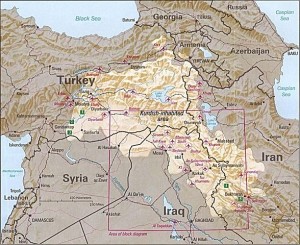
Adding more fuel to the flames, the Kurds located in the northeastern part of Syria have more or less declared a de facto state of their own; this despite Turkey’s vehement opposition. The Turks have been waging a separate war against the Kurds, who have emerged from the civil war as perhaps the only winners, aside from the Russians. They have escalated their drive for statehood to include the Kurdish minority living just over the Turkish border. The Kurds in neighboring Iraq have also made inroads of their own leading to the possibility of a united Kurdistan made up of the Kurdish communities in Syria, Iraq, and possibly Turkey in the future. This is a nightmare for Turkish President Recep Tayyip Erdogan, who has vowed to prevent it all costs.
If U.S. President Barack Obama thought that Putin had made a ‘grave blunder’ by sending Russian jets to Syria, he himself was mistaken also on the diplomatic arena. In fact, the new Russian tsar is raising peace proposals such as a ‘federal state’ comprised of designated areas for the various ethnic communities in territory they hold. But this will not be any Switzerland. It would spell the end of Syria as demarcated by British diplomat Sykes and his French counter-part Picot on a First World War map that was planned to replace the Turkish Ottoman Empire in 1918.
In any case, the Russian leader is basking on the international stage. This, after he was raked over the coals for sending Russian ‘volunteers’ to invade Ukraine in the Crimea dispute. Obama mounted an EU effort to slap economic sanctions on Russia. To his chagrin, Putin had his knuckles rapped. But now, Tsar Vladimir has emerged as a wily force to be reckoned with, and carefully projected Russian power in the Middle East. His appearance at a military ceremony welcoming the boys back to Russia has also gained him popularity at home. Now Putin has declared that his Syrian move came a very low cost in blood and treasure: one Russian jet shot down by a rash Turkish missile and possibly the Russian airliner blown up over Sinai. But Obama claimed that Putin’s intervention in Syria would ruin Russia’s economy:
‘Putin is running Russia’s economy into the ground!’
Putin has retorted that the Syrian gambit has cost only the equivalent of $484 million and moreover it served as ‘a good military exercise’. Putin may still be a bully, but in Syria he appears to have looked before he leaped and has emerged as a Russian Machiavelli.
Israel surprised…
Like everyone else, IDF Chief of Staff Gadi Eizenkot said he was also surprised by the Russian partial withdrawal. The IDF is in 24/7 contact with the Russian forces in Syria to prevent any miscalculation, such as between the Russian jet and the Turkish anti-aircraft battery. So far, this co-ordination, worked out by Netanyahu and Putin, has prevented any clash over Syria, which both sides want to avoid.
Israel maintains its declared policy of preventing Iran from sending ‘game-changing’ weapons via Syria to Hezbollah in southern Lebanon. According to foreign press reports they are bombed by Israel on the way. Any cross-border firing into Israel is also met with a swift IDF response. What is noteworthy is that Putin made a point of saying that advanced Russian S-400 anti-aircraft missiles will remain on Syrian soil, manned by Russians. This missile defense system covers most of Israel.
On a pre-planned visit to Moscow, Israel’s President, Reuven Rivlin, heard from the horse’s mouth about how Putin views the evolving situation in Syria. Rivlin received a warm welcome with all the pomp and ceremony while stressing Israel’s desire to preserve the good relations and the critical security hotline. Look for Bibi to seek another get-together with Vladimir to again touch base on Syria. Obama has abdicated any real U.S. role in the region, so now it’s every man for himself.
Ephraim Halevi, a former director of the Mossad intelligence agency, advises that Israel also have a thorough discussion with Russia on Iran, and particularly about the recent ballistic missile launches. A Russian step to block such tests of missiles (that can be armed with nuclear warheads) can greatly benefit both Jerusalem and Moscow. Halevi concluded:
‘The distance between Tehran and Tel Aviv is similar to the distance between Tehran and Moscow – this is an expression that I heard more than once while I was in Russia over the years’.
Meir Dagan ‘prevented Iran from going nuclear!’
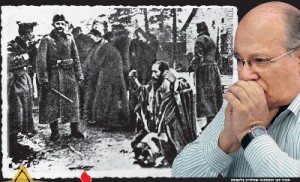
The death of former Mossad Director Meir Dagan has evoked a wave of national praise and sorrow. Dagan, a fearless combat officer who rose to the rank of general in the IDF, was renowned for his daring and was decorated with the IDF’s highest award for valor. Although never considered as a candidate for IDF Chief of Staff, he was highly rated by former Prime Minister Ariel Sharon, who appointed him Director of the Mossad, an agency similar to America’s CIA. It was there that Dagan really sparkled.
Sharon expected Dagan to turn his commando expertise into the field of intelligence. Iran was the prime target. It was during Dagan’s tenure that mysterious explosions and serious mishaps plagued Iran’s nuclear weapons project. Moreover, a number of Iran’s foremost scientists known to be working on the nuclear project were killed or disappeared. Another time, Iranian centrifuges used for uranium enrichment, suddenly went haywire. In addition, Israel reportedly supplied secret intelligence to the International Atomic Energy Agency in Vienna, which it then checked out and found to be true.
At one point, the Egyptian daily Al Ahram, no great friend of Israel but a bitter enemy of Iran, even printed an editorial crediting Dagan with ‘single-handedly blocking Iran from acquiring nuclear weapons’! During those years, critics often accused Israel of ‘crying wolf’ when it charged that Iran was headed for A-bombs, but this claim never panned out. Little did they know that it was Meir Dagan and his spooks that were repeatedly setting back the Iranian nuclear project.
After the alleged Mossad assassination of Mahmoud al-Mabhouh, a top Hamas weapons official, in Dubai in 2010, Netanyahu did not extend Dagan’s tenure. In retirement, Dagan became more and more critical of Bibi’s leadership and even voiced his opposition to an Israeli preventative strike on Iran’s nuclear facilities. Dagan argued that Iran was still not close to actually acquiring nuclear weapons and Israel should not go it alone.
Throughout his career, Dagan always displayed a photo of his grandfather that was taken by a Nazi photographer in a Polish ghetto during World War II. Wearing his tallit prayer shawl, his grandfather is on his knees before an SS officer shortly before he was shot to death. Meir Dagan showed the photo in honor of his grandfather and as a reminder – ‘Never Again’!


